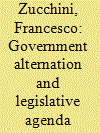| Srl | Item |
| 1 |
ID:
106942


|
|
|
|
|
| Publication |
2011.
|
| Summary/Abstract |
Recent studies of the legislative process have put forward a number of plausible hypotheses regarding the distribution of agenda-setting power. These hypotheses have guided scholars in identifying those conflicts and actors that are crucial to explaining legislative change and the wording of legislation. However, this has not yet led to a better understanding of the choice of specific agenda-setting rules. Why does the cabinet in some parliamentary democracies enjoy an undisputed role, while in others the parliament continues to play the role of co-protagonist? This article attempts to answer this question by looking at some well-known features of party systems. It is argued that in pivotal party systems, with limited government alternation, it is much more difficult to strengthen the government vis-à-vis the parliament. One factor prevents the procedural and institutional predominance of the cabinet under these circumstances: the lack of opportunities for, and expectations of, large and controversial policy change.
|
|
|
|
|
|
|
|
|
|
|
|
|
|
|
|
| 2 |
ID:
121753


|
|
|
|
|
| Publication |
2013.
|
| Summary/Abstract |
Scholars interested in legislative processes pay relatively little attention to the changes made to bills in parliamentary democracies. On the one hand, comparative research has often described parliamentary institutions as ineffectual vis-à-vis cabinets throughout the lawmaking process; on the other hand, for a long time the rational choice literature has focused more on the formal rules regulating amendatory activity than on amendatory activity itself. Hence, very few studies have tried to explain how much government bills are altered in parliament and why. This article investigates the changes made to governmental legislation in Italy. Taking the modifications occurring during the legislative process as the dependent variable, a number of explanatory hypotheses derived from both existing scholarship and original arguments are discussed and tested. This also allows the identification of some usually unobserved aspects of the decision-making process within the cabinet. The findings can also be relevant for comparative research since Italy has been characterised during the period under scrutiny (1987-2006) by two distinct electoral systems, two extremely different party systems (pivotal and alternational), governments with various ideological orientations and range, and both partisan and technical ministers.
|
|
|
|
|
|
|
|
|
|
|
|
|
|
|
|